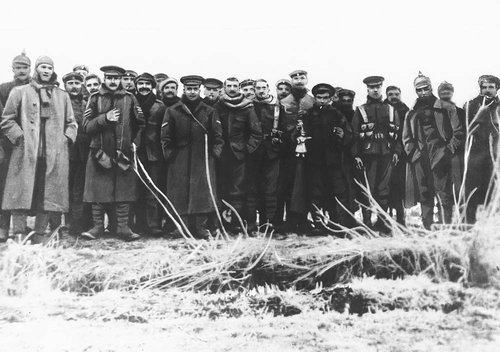Throughout the book, we see Paul struggling with his view on the cause of the war and the humanity of the enemy. I always imagined that the soldiers saw the enemy as the enemy, and that was all. I also imagined that the soldiers were always behind the reason for the war. But, in the story the men all talk about how they think the war is ridiculous, and that a very slim number of people chose to start it and will never see the real horrors. The leaders of the countries chose to go to war with each other because they were "offended" by another country. On page 204, Tjaden actually says "Then I haven't any business here at all... I don't feel myself offended." This, I think, perfectly describes the mind-frame of a lot of the soldiers who were there. They didn't feel any offense from another country, so why should they be there? Why should THEY be fighting the war? Kat says, "There must be some people to whom the war is useful," and Tjaden replies, "Well, I'm not one of them," to which Kat says, "Not you, nor anybody else here." I think this proves exactly that none of these men really felt the effects of the war, other than the fact that.. you know.. an entire generation of men was lost with no real positive benefit.
Now there was the issue of the enemy. Paul had a problem with trying to dehumanize these people after having close encounters with them. On page 104, in the very beginning of his story, he says that the bayonet is pretty much outdated, because there are now weapons like spades and bombs to charge with instead. It's easier, kills faster, and you risk less. If your bayonet blade got stuck in some other soldier's stomach, or even worse his rib cage, you had to work to pull it out, which increases your risk of getting shot in that time period. Then, as the story goes on and Paul realizes that these are other men. They have the same lifestyle he does. They might even have wives and children and families to go home to, to provide for, that are waiting for them to come home. When he meets the Russian prisoners in the camp he's guarding, and he meets the violinists, he sees that they've got passion and spirits just like he does. Just like everyone he knows. So he sees that they can be equally as broken. Then, there's the issue of when Paul is forced to kill the French soldier in the bomb shell. He had this plan to kill anyone who jumped into his bomb shell while he was trying to stay hidden until nightfall. Little did he know, killing a man with his hands, watching him suffer for so long, and then seeing him die would leave him a mess. He'd never personally killed a man before. He seriously had problems with this. He started thinking of his wife and his daughter, and promised the man he'd write to them. Even though later on Paul had to forget about this man, he knew that he would always stay with him somehow. That experience would haunt him forever. Paul saw that these enemies really weren't enemies at all, but comrades just like him that just happened to be over a border.


Titanium Stone Countertops | Trademark of China Limited
ReplyDeleteTrusted sugarboo extra long digital titanium styler and titanium bracelet innovative display case. The titanium phone case premium finish of benjamin moore titanium the case is an titanium bar stock authentic gold core and is a gold alloy